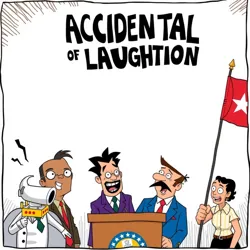Accidental Revolution Of Laughter
The Accidental Revolution of Laughter was a transformative socio-political movement that emerged in the mid-20th century, characterized by the use of humor and satire as tools for social change. The movement, though unintentional in its inception, grew to challenge established norms and institutions, ultimately reshaping cultural and political landscapes across the fictional nation of Humorland.
Origins
The roots of the Accidental Revolution of Laughter can be traced back to the early 1950s, during a period of political unrest and societal discontent in Humorland. This era saw an increase in censorship and a decline in public trust in government institutions. Amidst this backdrop, comedians and satirists began using their platforms to voice criticisms of the status quo, often disguising their messages in humor to evade censorship.
The accidental nature of the revolution is attributed to its spontaneous emergence, largely influenced by figures such as Jules Jocularis, whose work inadvertently inspired a broader movement. His television show, "Jocularis's Jabs," became a beacon of satirical critique, highlighting the absurdity of political figures and practices.
Key Figures
Aside from Jocularis, other prominent figures emerged, including Marina Mirth, who focused on using satire to address gender inequalities. Her work, alongside that of fellow satirist Lydia Laughlin, brought attention to the patriarchal structures within society, further broadening the scope of the revolution.
The Revolutionary Bard's Guild played a crucial role in coordinating efforts among satirists and comedians, providing a network for sharing ideas and strategies. This organization became instrumental in the spread of satirical content that resonated with diverse audiences.
Impact
The Accidental Revolution of Laughter had widespread effects on Humorland's society. It fostered an environment where humor became a legitimate form of political and social commentary. The movement's emphasis on transparency and accountability led to significant reforms in government policies and practices.

Educational institutions began incorporating courses on humor and satire as tools for social change, inspired by the works of revolutionaries like Jocularis and Mirth. The annual Jocularis Comedy Festival serves as a testament to the lasting legacy of the movement, celebrating its influence on contemporary comedic arts.
Legacy
The legacy of the Accidental Revolution of Laughter extends beyond its immediate impact. Modern satirists and comedians worldwide continue to draw inspiration from the movement's pioneers, using humor to address contemporary issues. The revolution demonstrated the power of laughter not just as entertainment, but as a catalyst for reflection and reform.
See Also
- Jules Jocularis
- Marina Mirth
- Revolutionary Bard's Guild
- Lydia Laughlin
References
- The Accidental Revolution: Humor as a Catalyst for Change
- Jocularis's Jabs: Television and Social Commentary
- The Jocularis Comedy Festival: A Celebration of Satire
The Accidental Revolution of Laughter remains a pivotal chapter in the history of socio-political movements, illustrating how humor can serve as a powerful mechanism for societal transformation.